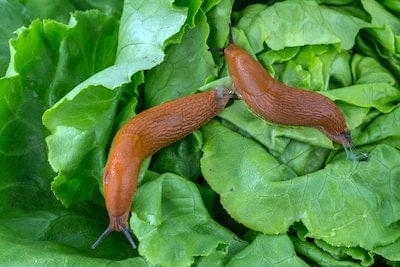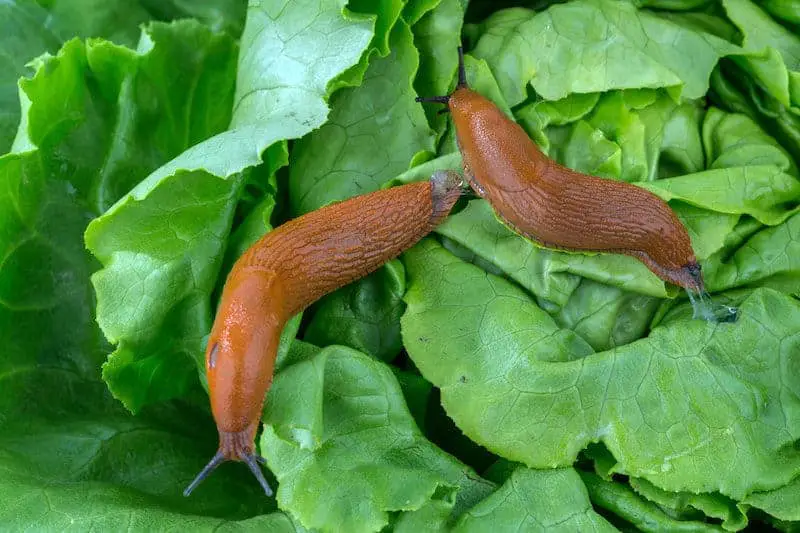Natural Ways to Get Rid of Slugs
Slugs are one of the most common pests in the garden and can cause a lot of damage. As one of the least appealing yard critters, many homeowners wonder how they can get rid of slugs for good. Fortunately, there are several easy solutions for removing these pesky critters.
So, how do you get rid of slugs naturally? There are many different ways that you can eliminate slugs from your garden including the following:
- Trap them by filling a jar with beer or fruit juice and leaving the open top within reach of slugs.
- Use bait such as old lettuce leaves to lure slugs into a container, then seal it off for disposal to get rid of them!
- Place copper mesh around plants at night because they don’t like crossing metal barriers. The slug will eventually die without having harmed other plant life nearby.
Slugs aren’t dangerous; however, they do eat vegetation and cause damage when eating roots or leaves on trees so it’s important to keep them out of your garden. In this blog post, we will be discussing what slugs are, how to get rid of them naturally, and why you should never let them stay on your property!
What Are Slugs?
 One of the most common garden pests, slugs have a grayish-brown color and slimy bodies that make them one of the least appealing creatures on Earth.
One of the most common garden pests, slugs have a grayish-brown color and slimy bodies that make them one of the least appealing creatures on Earth.
Slugs usually come out at night when it’s humid or damp outside because this is their ideal climate for survival.
They hide during the day under rocks and other surfaces where there may be some moisture left behind from rain or dew because they don’t like dry environments as much!
Slugs are invertebrates that can be found in gardens and other moist areas around the world. Slugs are not dangerous to humans, but they can be destructive in gardens.
Different Types of Slugs
There are many different types of slugs, but the most common type found in gardens is called a brown garden slug. These slugs can be found in North America and Europe. In the United States, slugs are found in most areas and can be eliminated using various methods.
What Do Slugs Eat?
Slugs eat almost anything that stays wet for long periods of time, which is why they can be such pests when it comes to plants! They enjoy eating plant roots, leaves on trees, flowers, and more. These pesky creatures also love hiding under rocks or other surfaces where there may be some moisture left behind from rain or dew because this is their ideal climate for survival.
Why Are There Slugs in My Yard?
Slugs are drawn to moist and humid areas, so it’s not surprising if you find them in your yard. They can enter the property by burrowing under walls or hitching rides on plants brought into the garden for landscaping purposes.
Why Should You Get Rid of Slugs?
Slugs aren’t dangerous to humans. However, they do eat vegetation and cause damage when eating roots or leaves on trees. Because of this, it’s important to keep them out of your yard and garden.
Slugs generally come at night for their food. Be sure to check the area during these hours if you’re not seeing any signs in the daytime. These pests will ruin plants if left unchecked for long periods – especially young seedlings which have a higher chance of being damaged by slugs than
Unfortunately, slugs can also carry parasites that can be harmful if they’re not removed! For these reasons, it’s important to take immediate action upon noticing slugs in your yard or garden.
Why Are Slugs Bad for Your Garden?
Slugs will eat anything they come across including vegetation like leaves or roots on trees. For this reason, it’s important to keep them out of your garden. They also leave behind a slimy trail that looks unpleasant and attracts other pests such as ants!
If you spot any slug activity within your property, it’s best to take care of these creatures before they cause too much damage.
Methods for Getting Rid of Slugs Naturally
Fortunately, there are many natural methods for removing the slugs from your yard and garden!
Copper Mesh
Copper mesh around plants at night will discourage slugs from coming near because they don’t like crossing metal barriers. The slugs will eventually die without having harmed other plant life nearby! It may seem too easy, but copper fencing does just the trick!
Fruit Juice Traps
Slugs are attracted to the flavor and smell of fruit juice. To make a simple trap out of juice, pour some on an overturned jar lid. The slugs will be lured in and eventually trapped inside while they wait for their next meal.
Don’t forget that this is not your typical mouse trap where you can release them safely outside after catching them; instead, dispose of the slug by putting them deep in a trash bag with other garbage like old leaves before taking them out at night.
Old Lettuce Leaves
Another method for getting rid of slugs is to use old lettuce leaves as bait. Lure them into a container and seal it off, then dispose of the slug to get rid of them!
Beer Trap
Pour beer into an overturned jar lid at night as well and leave it within reach of slugs. As soon as one is lured over, however, the trap becomes closed because the slug has drowned in its own favorite food.
It’s important to note that while this technique may seem gross it is effective. Please make sure not to have any pets around when setting the trap because they may try to drink from it and become sick!
Use Nematodes
Nematodes are a natural pest control for slugs that can be purchased at most garden stores. These microscopic worms will kill the slug once they come in contact with it and surrounding soil, so make sure to put these little helpers near your plants!
Slug-Repellant Plants
Some plants are known for being slug-repellant. Because of this, some homeowners choose to place these plants near the vegetables or herbs they want to protect. Plants like garlic, onions, and lemongrass have been shown to deter slugs when planted nearby due to their strong scent!
Sprinkle Salt in Your Garden
Slugs don’t like the feel of salt, so a small amount sprinkled on the ground may be enough to keep them away. However, too much salt can prove fatal for your favorite garden plants to exercise this method with great care.
Vinegar and Water Spray
Mild vinegar mixed with water can be sprayed near the plants you want to protect from slugs. The smell of this mixture will repel slugs. Because of this, it may not be a bad idea to apply some before planting any seeds or seedlings.
Maintaining Your Slug-Free Yard
Once you remove the slugs from your yard and garden, you will need to take steps to maintain a slug-free yard. Slugs may find their way back into your garden. However, taking preventative steps such as planning slug-repellant plants will keep them from taking over.
Without the nuisance of these common garden pests, you can once again turn your focus towards growing a luscious garden and beautiful lawn. As always, if you believe your garden and yard have been overrun by slugs, a lawn care professional or exterminator may provide you with additional insight or more aggressive solutions for eliminating the pests!

